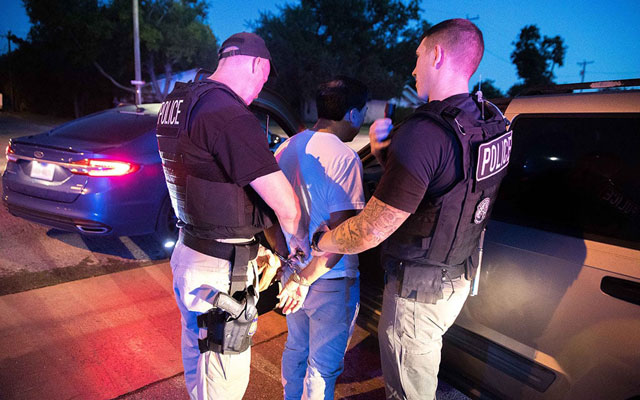Photo by Charles Reed/U.S. Immigration and Customs Enforcement: Federal officers from Immigration and Customs Enforcement arrest criminal fugitives in this photo from June 2020. The Arizona Senate voted Wednesday for a bill that would make it a state crime to illegally enter the state – a bill that opponents say is both unconstitutional and racially motivated.
Martin Dreyfuss/Cronkite News
PHOENIX – The Senate voted Wednesday to make it a state crime to illegally enter Arizona by crossing the border between ports of entry – a proposal that Democratic opponents called both racially motivated and unconstitutional.
The 16-13 party-line vote followed nearly two hours of sometimes heated debate in which opponents invoked the state’s failed SB 1070 law and supporters pointed to failed federal control of the border.
“This will create fear for anyone with black or brown skin,” said Sen. Priya Sundareshan, D-Tucson. “We must all stand together in solidarity against this harmful bill.”
Republicans reacted angrily to the charge that the bill was racially motivated.
“This has nothing to do with skin color, not my vote, not to do with your skin color or anybody’s skin color,” said Sen. David Gowan, R-Sierra Vista.
Should it win House approval, the bill is almost certain to be vetoed by the governor, but that did not deter Republicans from pushing the bill that they said is a tool that is needed and that police have been asking for.
The bill would make it a state crime to be caught trying to cross the border between points of entry or “to be found at any time” in the state if the person had been denied entry previously. Simple “illegal entry” would be a misdemeanor, but it could be elevated to a felony for those with previous convictions.
People charged with illegal entry could be ordered back to their home countries by a state judge or magistrate, who would have the authority to drop the illegal entry charge in exchange. It includes language to shield local officials from being sued for enforcing the law.
The law would not apply to those granted asylum to stay in the U.S. or to recipients of Deferred Action for Childhood Arrivals, or DACA, the program that prevents deportation of undocumented migrants who were brought here as children.
The bill mirrors a law passed last year in Texas that would make illegal immigration a state crime there. That law has since been challenged in court, but one critic Wednesday said the Arizona bill “is just us following Texas’ crazy lead.”
But critics more often compared the current bill to Arizona’s SB 1070 – the so-called “show me your papers” law that let police question the citizenship status of anyone they had stopped. That 2010 law was struck down in 2012 by the U.S. Supreme Court, which said a state law making it illegal to be in this country without documentation infringed on the federal government’s authority to set and enforce immigration law.
Many Democrats on Wednesday harkened back to the fear that SB 1070 caused the state’s Hispanic residents.
“Within 12 months, I was pulled over more than 10 times by law enforcement,” Sen. Rosanna Gabaldón, D-Sahuarita, said of the effects of SB 1070. “When I asked, ‘Why did you pull me over?’ they said, ‘You don’t belong here, you are here illegally, I need you to prove your citizenship.’”
Democrats further warned of myriad “unintended consequences” from passing the bill, from economic impact through the loss of immigrant workers and taxpayers to political blowback that they said Republicans will face.
Many Republicans were like the bill’s lead sponsor, Sen. Janae Shamp, R-Surprise, who accused Democrats of beating “the drum of the past to spread fear and misinformation” by dredging up SB 1070.
“There is nothing in here that has to do with 1070; I worked hard to make this a tool that our law enforcement has been asking for,” Shamp said.
One thing both sides agreed on throughout the debate is that the federal government is failing Arizonans by not securing the border. Republicans said that means it is up to the state to protect itself.
“When you have a situation where the federal government has turned border control into a welcome wagon, that is when states must step up and do their part,” Sen. John Kavanagh, R-Fountain Hills.
Kavanagh said he believes this bill would survive a court challenge, unlike the ruling on SB 1070, “because frankly, I believe this Supreme Court will uphold the protection of our border.”
Joseph Garcia of Chicanos por la Causa Action Fund disagreed, saying SB 1231, the bill debated Wednesday, is “SB 1070 2.0.”
“For Arizona, we have gone through this before, with SB 1070. We have suffered two self-inflicted black eyes, from boycotts of visitors and a loss of income,” Garcia said. “I am disappointed but not surprised that Arizona has not learned its lesson.”
Sen. Anna Hernandez, D-Maryvale, told her colleagues they should run for federal office if they want to fix what she said “is a federal issue.”
“Instead of coalescing to put pressure on our federal representation, which has been an issue of both Democratic and Republican legislatures, we are bringing legislation that is so harmful to our communities,” she said.
Gov. Katie Hobbs’ office did not immediately respond to a request for comment on the bill.








